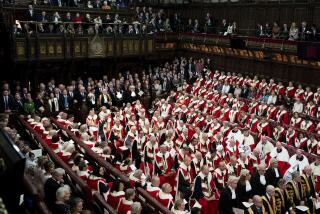Barbados Plans to Remove British Crown
- Share via
BRIDGETOWN, Barbados — After more than three centuries under British control and 32 years as an independent state, this remote Caribbean isle once dubbed “The Little Britain” for its refined social graces and loyalty to the crown is poised to take the final step into full nationhood: disowning the queen.
With a vow to reexamine the island’s decades as a constitutional monarchy under Queen Elizabeth II, Barbadian Premier Owen Arthur was reelected this week in a landslide victory--winning 26 of 28 seats in the House of Assembly.
Arthur and his Barbados Labor Party now have far more than the two-thirds majority they need to amend the constitution and make Barbados a republic without a monarch, a plan that Arthur said will be debated in the near future.
Not that the election results mattered much. Even the opposition Democratic Labor Party agrees that the queen’s rule should end. An independent constitutional commission here also recommended the move last year.
And in a new era of neo-nationalism, other former colonies may follow suit.
In breaking with the last vestiges of its colonial past, this sophisticated and prosperous nation of about 260,000 is expected to lead the way for such nations as Belize and Australia, where politicians are discussing a similar move.
A handful of the former colonies in the Caribbean--Guyana, Dominica, and Trinidad and Tobago--abandoned the queen years ago soon after independence. Barbados is among 16 nations that have kept the queen’s role even after shedding colonial rule.
Proponents of the new republic here acknowledge that the move, which took a back seat to economic issues in the election, would be largely symbolic. Ending the queen’s rule merely will eliminate the position of governor-general, a royal appointee whose powers are largely ceremonial, to be replaced by a figurehead president.
But that symbolism, the backers stress, is paramount.
“When you want to build nationhood, symbols are important,” said Louis Tull, a veteran ruling party politician. “We want to usher in a new millennium, with progressive new ideas and leaders, and the feeling among our thinkers and the young here is that the monarchy has become irrelevant.”
Independent political analysts say “demonarchization” reflects a more profound trend afoot.
“In the Caribbean generally, there seems to be a handing of the torch from one generation to the next,” said one diplomat based in the region who asked not to be identified. “The islands here are reaching toward a new political maturity.”
Arthur, 49, embodies that change. He was among the nation’s youngest prime ministers when he came to power in 1994, and his victory institutionalized a distinctly nationalistic foreign policy.
Under Arthur, Barbados was among the region’s last states to sign counter-narcotics agreements with the United States that permit the U.S. Coast Guard to pursue and board suspect vessels in their territorial waters. Arthur agreed to sign only after the U.S. modified the pact to limit its authority here.
Other young leaders in the region have set a similar tone, turning increasingly away from the U.S. and Europe and toward each other in recent years.
Prime Minister Kenny Anthony in nearby St. Lucia is a frequent critic of U.S. trade policies that seek to end preferential European trade agreements subsidizing the region’s banana trade, and he has endorsed Arthur’s drive to form a federation of eastern Caribbean states.
And in Grenada, Prime Minister Keith Mitchell, 52, who also was reelected this week in a landslide that gave his New National Party all 15 seats in the House of Representatives, last year hosted the first visit by Cuban President Fidel Castro since the U.S. invaded the island in 1983 to drive out Cuba’s influence.
“What we’re witnessing now is not a new era of anti-Americanism in the Caribbean,” the diplomat added. “It’s a transition, a maturing process. And ending the monarchy is just one logical step along the way.”
More to Read
Sign up for Essential California
The most important California stories and recommendations in your inbox every morning.
You may occasionally receive promotional content from the Los Angeles Times.










